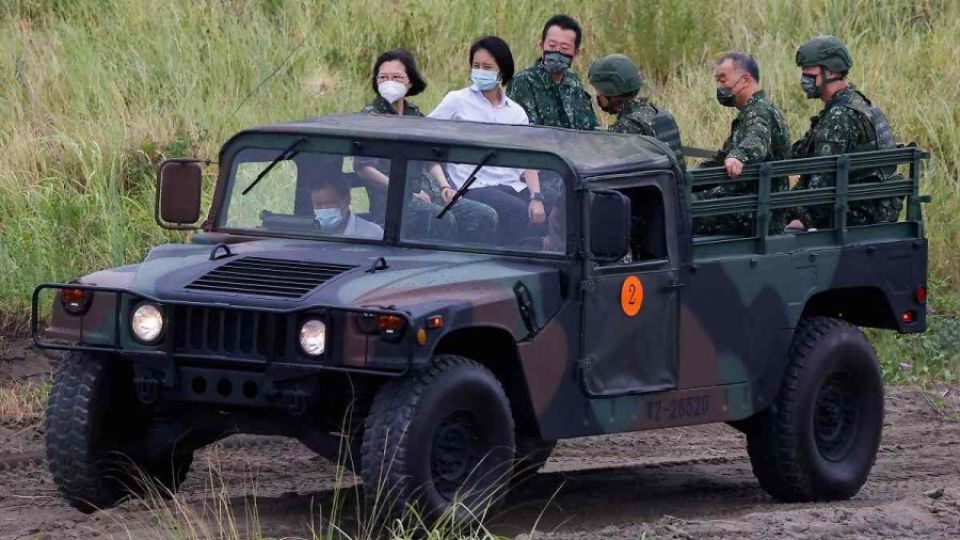September 18, 2023
WASHINGTON/TAIPEI – The U.S. military plans to train a Taiwan Army battalion at a military base in the United States by 2025 as part of its efforts to help Taiwan strengthen the capabilities of its armed forces, it has been learned. The move is aimed at helping the Taiwan military become capable of defending the island in the early stage of a Taiwan contingency.
According to sources close to U.S.-Taiwan relations, it would be the first time for a Taiwan battalion, with a strength of 600 to 800 troops, to be trained by the United States. The U.S. side intends to strengthen deterrence against China by demonstrating deepened cooperation between Washington and Taipei.
A top-level training facility in California has been named as a candidate venue, the sources said.
The training of Taiwan Army personnel in the United States started at the platoon level of about 10 soldiers, and the U.S. side now hosts companies of 150 to 250 troops each.
The focus of the training will be how well the Taiwan armed forces could defend the island by themselves at the early stage of fighting if the Chinese military were to launch an invasion of Taiwan. A U.S. military source said that the United States needs to become confident that Taiwan can hold out in the first few weeks in case a Chinese invasion of Taiwan begins.
In January, it became known that a senior U.S. Air Force officer had written an internal memorandum predicting a Taiwan contingency in 2025 and ordering officers under his command to speed up preparations for the potential contingency.
Under such circumstances, the United States is enhancing the Taiwan military’s capabilities.
In August, members of Taiwan’s military participated in joint military drills led by the Michigan National Guard held in the Midwestern U.S. state. The drills were part of training involving the U.S. Defense Department, and according to officials, the Taiwan military has participated in national guard-led drills in Utah, Hawaii and Washington state for about 10 years.
In addition, a total of 2,000 to 3,000 personnel from the U.S. armed forces and the Defense Department are said to be dispatched annually to Taiwan to provide short-term training. They teach how to use weapons as well as exchange expert opinions with Taiwan side.
Invasion of Taiwan ‘Would Have Dire Results for Xi Jinping’
It has been learned that the U.S. military is getting serious about training Taiwan forces in preparation for a contingency. The following edited remarks are excerpted from a Yomiuri Shimbun interview with James Moriarty, former chairman of the American Institute in Taiwan, regarding U.S.-Taiwan relations and China.
The visit by Taiwan Vice President Lai Ching-te [to the United States in August] was handled as cautiously as the Chinese could have expected in their wildest dreams. He behaved himself. He didn’t come anyplace close to Washington. He did not meet with any U.S. officials, even congresspeople, so it was a very low-profile visit.
I think Lai’s goal was to reassure his American interlocutors that he was a safe bet, a steady hand on the tiller, that he wasn’t going to do anything crazy. I think he got the message across and I think it was a message that was welcomed.
Taiwan independence is something that every [U.S.] administration says we’re not promoting. The one thing that strikes me is he’s a very smart politician. He is no Chen Shui-bian [Taiwan’s president from 2000 to 2008 who was more independence-minded and worsened relations with the United States]. He has no intention of doing anything that would cause an over-the-top reaction by China — at least as the United States would define it — and Taiwan.
But yet the Chinese feel compelled to hold large-scale military exercises crossing the midline [of the Taiwan Strait] and making it look like they are doing this as a preparation for an attack even if that’s not their intention.
Xi Jinping will continue to pressure Taiwan toward the goal of reunification, but he is unlikely to take military action anytime soon amid the country’s economic and diplomatic problems.
Xi Jinping believes that he has to solve the Taiwan question on his watch. We want to make it clear that an attack on Taiwan would be disastrous for him and for the Chinese Communist Party.
I like to use what they call the DIME [Diplomacy, Information, Military, Economic] paradigm. Basically, to deter a power, you have to use all these various tools of your own national power. One is diplomacy, another is the information space. The third is military and security, and the fourth is economic.
You work in all those areas to convince them that the cost of action would be too high, that it will not serve their interest to do it. We’ve been very active in all those areas. We’re pretty successful on the way the United States and Taiwan handle many of them, but it’s something that we have to continue.

